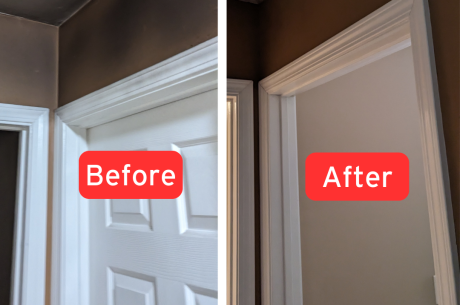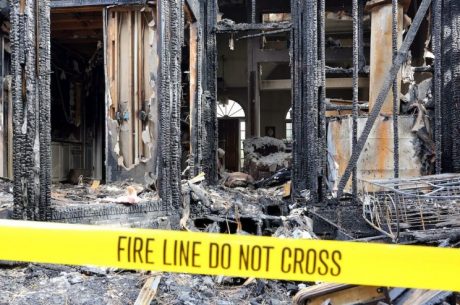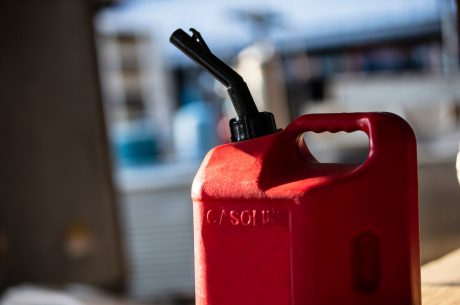When you experience a house fire, quick and informed action is essential to recovery. Your immediate decisions can significantly impact your property restoration and your path back to normalcy. The first and most crucial step is to contact your insurance agent without delay. They will guide you through the complex process of dealing with fire damage and insurance claims. Here are key topics to discuss and specific questions to ask your insurer after a fire.
Questions to Ask Your Insurer after a Home Fire
1. What steps can I take to protect what remains of my home if the fire hasn’t completely destroyed it?
Preventing further damage is important because it can save you money and preserve some of your property’s value. Depending on the situation, your agent may advise you to cover windows to protect against weather damage, set up a temporary fence to secure the property from trespassers, or use tarps or boards to cover exposed areas. Additionally, your agent might recommend a company that can assess structural damage and provide immediate protective measures.
2. Can you recommend disaster remediation companies that can restore burnt surfaces, clean up soot, and remove smoke odor?
Quick action in cleaning and remediation is important because it can prevent further damage and help restore your home more efficiently. Ensure the company you choose is reputable and experienced in dealing with fire damage. They should be able to clean and restore burnt surfaces, clean up soot and ash residue, and remove the pervasive smoke odor. Your insurance agent should have a list of trusted companies that can perform these tasks, but of course, at the top of the list for our friends in the Plainfield, Oswego, Naperville, IL and surrounding areas is Puroclean Romeoville.
3. Does my policy include reimbursement for temporary housing if I cannot return to my home after the house fire?
Knowing your coverage for temporary living arrangements is important because it ensures you have a place to stay without financial strain. Clarify what expenses are covered under your policy, such as temporary accommodation costs, food, and other daily living expenses. Some policies may only cover specific costs, so it’s essential to understand what is and isn’t included. Also check to see if your insurance company has special deals or partner hotels they work with.
4. Should I rebuild or sell my home after the house fire?
When deciding whether to rebuild or sell your home after a fire, several factors should be considered. First, determine if your insurance will cover all necessary repair costs; if not, selling might be a more viable option.
Next, consider the pre-fire condition of your home; if it was already in poor shape, rebuilding might not be worth the investment. Additionally, evaluate the extent of the damage; if the damage is minor and repairs are feasible, rebuilding could restore your home to its original or even better condition.
Finally, seek your agent’s advice, as they can provide insights based on the extent of the damage and your policy coverage, helping you make an informed decision.
5. What aspects of my home and belongings are covered under my policy?
Dwelling Coverage: What aspects of the home structure are covered in the case of a fire in your house? Typically, this includes the main structure of your home, such as walls, roof, and foundation, as well as any attached structures like garages or decks. It’s important to review your policy to know the specifics, including any exclusions or limitations that might apply.
Personal Property: What personal belongings are covered, and is there a limit? This often includes furniture, electronics, clothing, and other personal items. Be aware that there may be a limit on the total amount covered or on specific high-value items like jewelry or artwork. It’s crucial to understand these limits to ensure you have adequate coverage.
Additional Living Expenses (ALE): Coverage for temporary housing and related expenses. ALE coverage helps pay for temporary housing and related expenses if your home is uninhabitable due to fire damage. This can include hotel bills, restaurant meals, and other costs incurred while your home is being repaired. Knowing the extent of ALE coverage in your policy will help you plan for your immediate future without financial strain.
6. What specific documentation is required to prove the loss?
Proof of Loss: What specific documentation is required to prove the loss? This usually includes a “proof of loss” form, which is a detailed inventory of all items damaged or lost in the house fire, along with their estimated values. Accurate and thorough documentation is critical for processing your claim efficiently.
Receipts and Inventory: Importance of providing receipts for damaged items and maintaining an inventory list. Providing receipts for damaged items can substantiate your claims and help ensure you receive the appropriate compensation. Maintaining an inventory list of your belongings, ideally with purchase dates and costs, can simplify this process. If you don’t have receipts, try to provide other evidence of ownership and value.
Photographic Evidence: Guidelines for taking photos of the damage: Taking photos of the damage is a crucial step in documenting your loss. Ensure you capture all affected areas and items from multiple angles (from the top, sides and bottom and inside/outside if applicable.) Follow any specific guidelines provided by your insurance company regarding photographic evidence to ensure your documentation meets their requirements.
7. What are the steps involved in filing a claim, and what should I expect?
Adjuster Visits: When will an adjuster visit the property? An adjuster will visit your property to assess the damage firsthand. This visit is a crucial part of the claims process, as the adjuster’s report will significantly influence the settlement amount. You should be informed about when to expect the adjuster’s visit and how to prepare for it, including having all documentation and evidence ready.
Claim Filing Process: Steps involved in filing a claim. The steps typically start with notifying your insurance agent about the fire. You’ll then need to submit a “proof of loss” claim along with all necessary documentation. Your insurance company will review your claim, and an adjuster will be assigned to assess the damage.
Timeline Expectations: How long will the claims process take? Understanding how long the claims process will take is important for planning your recovery. While timelines can vary, your insurance company should provide an estimate of how long each stage of the process will take, from initial filing to final settlement.
For Fire Damage Restoration, Contact PuroClean Romeoville Today
Using this list of questions to ask your insurer after a fire you can navigate the aftermath of a fire more effectively and ensure you receive the necessary support and compensation from your insurance provider. It’s crucial to act swiftly to mitigate further damage and begin the restoration process.
PuroClean Romeoville specializes in comprehensive fire damage restoration services, including soot and smoke removal, structural repairs, and thorough cleaning. Our experienced team is equipped to handle the complexities of fire damage, providing you with peace of mind during this challenging time.
Don’t wait—contact PuroClean Romeoville today to start rebuilding and restoring your home to its original condition.




 PuroClean of Romeoville
PuroClean of Romeoville